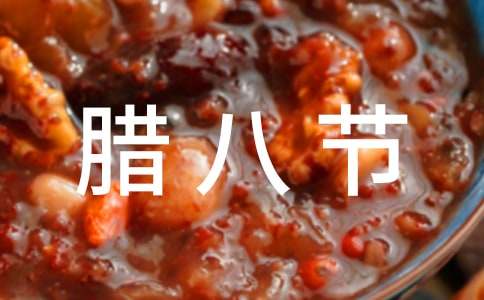腊八节英文介绍
无论是身处学校还是步入社会,大家最不陌生的就是腊八节了吧,还是对腊八节一筹莫展吗?下面是小编精心整理的腊八节英文介绍,欢迎大家分享。

腊八节英文介绍
中国农历十二月初八是中国的传统节日——腊八节,关于腊八起源的传说有很多,我们已经不能辨其真假,时至今日我们确定的是这个节日起初是为了祭祀祖先,祈求丰收以及为即将来到的`一年祈福。下面就让我们一起来看看腊八节英文介绍!
腊八节英文介绍
The Laba Festival is a traditional Chinese holiday celebrated on the eighth day of the twelfth month of the lunar Chinese calendar. "La" is the name given to the 12th lunar month and 8 is pronounced as "ba" in Chinese, which translated is "Laba." There are several legends about the origin of this festivity and we could not tell which one is true. But what we know today is that this festival started as a sacrificial offering to ancestors. It was also a time for the ancient Chinese to pray to heaven and earth that there would be a bountiful harvest. Many people hoped for good luck as well for the coming year.
Traditionally, the Laba rice porridge is the most important element of the festival. Generally, the porridge contains eight ingredients which can include glutinous rice, red beans, millet, Chinese sorghum, peas, dried lotus seeds and some other ingredients, such as dried dates, chestnut meat, walnut meat, almond, peanut, etc. The porridge must be boiled for many hours and then offered as a sacrifice to the ancestors. This must be done before noontime. Also, it is tradition that family members eat the porridge together. Then they leave some as a symbol of hope for a good harvest the coming year.
Another custom is the soaking of Laba garlic. Garlic is soaked in vinegar for more than twenty days starting from Laba festival. Then when the Chinese New Year comes, the garlic and vinegar is used alongside jiaozi on the table.
腊八节的起源
Labais celebrated on the eighth day of the last lunar month, referring to thetraditional start of celebrations for the Chinese New Year. La in Chinese meansthe 12th lunar month and ba means eight.
Legendsabout the origin of this festivity abound. One holds that over 3,000 years agosacrificial rites called La (腊) were held in the twelfth lunar monthwhen people offered up their preys to the gods of heaven and earth.
The Chinesecharacters for prey (猎) and the twelfth month (腊 La) were interchangeable then, and ever since La has been used torefer to both. Since the festival was held on the eighth day of the Last month,people later appended the number eight (ba in Chinese), giving us the currentLaba.
关于腊八的传说
Theeight-treasure porridge was first introduced to China in the Song Dynasty about900 years ago.
Buddhismwas well accepted in the areas inhabited by the Han Chinese, who believed thatSakyamuni, the first Buddha and founder of the religion, attained enlightenmenton the eighth day of the twelfth month. Sutras were chanted in the temples andrice porridge with beans, nuts and dried fruit was prepared for the Buddha.With the passing of time the custom extended, especially in rural areas wherepeasants would pray for a plentiful harvest in this way.
Thereis, however, another touching story: When Sakyamuni was on his way into thehigh mountains in his quest for understanding and enlightenment, he grew tiredand hungry. Exhausted from days of walking, he passed into unconsciousness by ariver in India. A shepherdess found him there and fed him her lunch -- porridgemade with beans and rice. Sakyamuni was thus able to continue his journey.After six years of strict discipline, he finally realized his dream of fullenlightenment on the eighth day of the twelfth lunar month. Ever since, monkshave prepared rice porridge on the eve and held a ceremony the following day,during which they chant sutras and offer porridge to Buddha. Thus, thetradition of eating Laba porridge was based in religion, though with thepassing of time the food itself became a popular winter dish especially in coldnorthern China.
Accordingto written records, large Buddhist temples would offer it to the poor to showtheir faith to Buddha. In the Ming Dynasty about 500 years ago, it became sucha holy food that emperors would offer it to their officials during festivals.As it gained favor in the feudal upper class, it also quickly became popularthroughout the country.
腊八粥的8种原料
糯米:glutinous rice
红豆:red beans
小米:millet
高粱:Chinese sorghum
花生:peanuts
莲子:dried lotus seeds
枣子:dried dates
杏仁:almond
LABA PORRIDGE
The laba porridge is not only a yummy traditional rite in China to mark the laba festival but also a delicacy good for health.
腊八节喝腊八粥是中国传统习俗,腊八粥不仅好喝,对身体也十分有益。
腊八粥,表达为“laba porridge”;“la”即“腊”,农历12月就是“腊月”,即“12th lunar month”。腊八就是腊月初八,这天要喝的腊八粥也称八宝粥,即“babao porridge(eight treasures)”。
腊八粥由多种食才熬制,但所用材料各地不同,主要成分包括糯米 glutinous rice,红豆 red beans,薏米 millets,大米 Chinese sorghum,莲子 lotus seeds,枣 dates,栗子 chestnuts,核桃 walnut,杏仁 almonds,花生 peanuts等。
LABA GARLIC
In North China there is a custom of pickling garlic in vinegar on Laba Day. After some pickling, the garlic will turn green. This pickled garlic goes very well with dumplings. In Chinese, the words “garlic” and “calculate” have the same pronunciation; therefore, eating garlic on Laba Day is symbolic of reckoning the year’s income and expenses as year-end approaches.
LABA NOODLES
Because northerners like foods made from wheat flour, they eat Laba noodles on Laba Day.
BOILING FIVE KINDS OF BEANS
In some areas, people boil five kinds of beans and make a dough in the shape of sparrow’s head on the eighth day of the 12th lunar month. They believe if they eat “sparrow heads”, the sparrows will have headaches and not harm their crops in the coming year.
EATING ICE
Northerners have a custom of leaving a basin of water outside the house to be frozen; they break this ice into pieces and eat it on Laba Day. The ice on this day is said to possess supernatural power, capable of keeping those who eat it free from stomachache for a whole year.
【腊八节英文介绍】相关文章:
腊八节的来历英文02-05
腊八节的风俗介绍02-04
腊八节的由来介绍02-05
腊八节的传说介绍02-05
腊八节的习俗介绍02-05
关于腊八节的来历介绍02-04
腊八节吃什么介绍02-05
山东腊八节的习俗介绍02-05
腊八节来历详细介绍02-04
